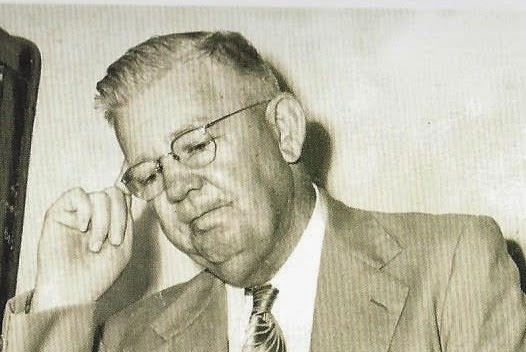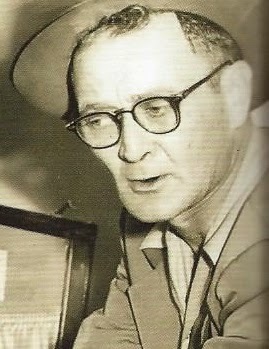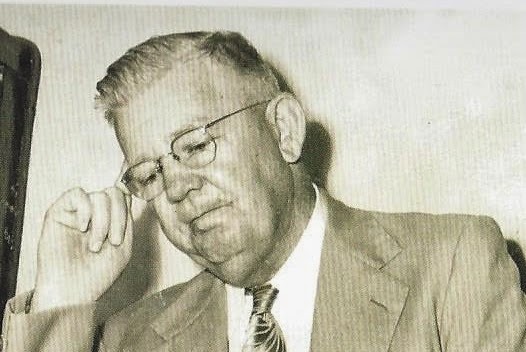Larry Watts's Blog, page 6
June 29, 2014
A POLICE CHIEF RESIGNS – If the Walls Could Talk – Episode 4
 Chief L.D. Morrison, Sr.
Chief L.D. Morrison, Sr.(1954) The Feds were in Houston investigating local police for selling heroin to dope dealers. Detective M.A. Billnitzer, shot twice in the heart at the police station, was dead. The Police Chief, L.D. Morrison, Sr., by his own admission in testimony, didn’t hear of the seizure of a large amount of heroin that occurred in August of 1953 until June of 1954, although he ordinarily was told of any narcotics seizure. The police department was much smaller in 1953 and illegal narcotics trade was becoming a major police problem. But Morrison apparently didn’t learn of the dope deal until the Federal investigation was about to become public.
 Martin Billnitzer
Martin BillnitzerAfter the death of Detective Billnitzer, Morrison relieved Captain Melton of duty and fired Detective Sidney Smith. He seems to have discounted any scandal beyond the actions of Smith. He later testified on behalf of Melton who was tried twice but not convicted. I’ll have more on Melton in later episodes.
In addition to the corruption that was taking place in his police department, Chief Morrison must have been uneasy when the Feds started snooping around for another reason. He had back problems and had found a doctor, Julius McBride, who supplied him with codeine which the doctor recorded as going to a patient who had cancer. When McBride was indicted, the charge said that he supplied the dope to the Chief for “non-medicinal” purposes. Medical experts from Baylor University testified in McBride’s trial that Morrison was caught up in the grip of the drug habit and well on his way to becoming an “addict” from frequent administration of codeine.
 61 ReisnerChief Morrison resigned as Chief when the narcotics scandal became public. His reputation within the police department seems to have survived the scandal, including his improper use of codeine. The current Houston Police Academy building is named in his honor. In the book, HOUSTON BLUE, authors Tom Kennedy and Michael P. Roth write that “Morrison is known as the father of HPD academic training...” That honor was accrued prior to his being appointed police chief and when he initiated the first academy class. His son, L.D. Morrison, Jr., later became a Houston officer and retired as a Captain in the Homicide Division.
61 ReisnerChief Morrison resigned as Chief when the narcotics scandal became public. His reputation within the police department seems to have survived the scandal, including his improper use of codeine. The current Houston Police Academy building is named in his honor. In the book, HOUSTON BLUE, authors Tom Kennedy and Michael P. Roth write that “Morrison is known as the father of HPD academic training...” That honor was accrued prior to his being appointed police chief and when he initiated the first academy class. His son, L.D. Morrison, Jr., later became a Houston officer and retired as a Captain in the Homicide Division.Next week’s episode will tell more about Officer W.C. Pool, Federal Agent George White, and an interesting note about another officer who testified before the federal grand jury, J.O. Brannon. Stay tuned and check out my novels in paperback or as Kindle e-books.
Published on June 29, 2014 15:35
June 23, 2014
THE MYTH OF THE BLUE CODE OF SILENCE – If the Walls Could Talk – Episode 5
 W.C. Pool(1954) A large haul of heroin had been recovered. The three officers who brought it in were told by Captain Foy Melton that he was taking possession of the dope because it was part of a much larger narcotics investigation. The officers became suspicious that there was no such investigation and that the heroin seizure was not reported. They decided to tell fellow officer W.C. Pool about the case.
W.C. Pool(1954) A large haul of heroin had been recovered. The three officers who brought it in were told by Captain Foy Melton that he was taking possession of the dope because it was part of a much larger narcotics investigation. The officers became suspicious that there was no such investigation and that the heroin seizure was not reported. They decided to tell fellow officer W.C. Pool about the case.There’s a belief among those critical of law enforcement that a Blue Code of Silenceexists among officers, meaning that there is an unwritten rule that officers will not report on another officer’s errors, misconduct, or crimes. While this may be true regarding errors and minor misconduct, there is abundant evidence that officers often come forward to report the criminal acts of fellow law enforcement officers.
 Joe ClarkSuch was the case regarding the missing dope. At least two Houston officers reported their suspicions to the Harris County D.A. W.C. Pool was first. The D.A. told him to forget about the dope and if he couldn’t forget, he should look for another job. Soon after, Captain Joe Clark also took the case to the D.A. Clark reported that dope dealer Earl Voice told him officers were selling the heroin they had confiscated previously. The D.A. said there was not enough evidence and did nothing. Later, when questioned by reporters as to why he went to the D.A. instead of his superiors in the Department, Clark said he thought his superiors might have been involved in the criminal activity, all the way to the Chief.
Joe ClarkSuch was the case regarding the missing dope. At least two Houston officers reported their suspicions to the Harris County D.A. W.C. Pool was first. The D.A. told him to forget about the dope and if he couldn’t forget, he should look for another job. Soon after, Captain Joe Clark also took the case to the D.A. Clark reported that dope dealer Earl Voice told him officers were selling the heroin they had confiscated previously. The D.A. said there was not enough evidence and did nothing. Later, when questioned by reporters as to why he went to the D.A. instead of his superiors in the Department, Clark said he thought his superiors might have been involved in the criminal activity, all the way to the Chief. George WhiteBut Officer Pool refused to take the advice given him by the D.A. Instead he contacted a federal agent he was acquainted with in Houston. It wasn’t long before an investigation began, headed by Federal Bureau of Narcotics supervisor George White. He came with solid credentials. He had been the chief investigator for the Kefaufer Committee on Crime in America. White did not initially inform Houston’s police chief of the investigation. He was to become a controversial figure in the matter, after Police Chief Morrison and City Attorney Will Sears demanded of the Feds that he be removed from the investigation. In addition to other complaints, they alleged that he was responsible for Billnitzer's death because he "browbeat" him during questioning. White called the charges ridiculous and stayed on the case, suggesting that the pressure was getting to Morrison.
George WhiteBut Officer Pool refused to take the advice given him by the D.A. Instead he contacted a federal agent he was acquainted with in Houston. It wasn’t long before an investigation began, headed by Federal Bureau of Narcotics supervisor George White. He came with solid credentials. He had been the chief investigator for the Kefaufer Committee on Crime in America. White did not initially inform Houston’s police chief of the investigation. He was to become a controversial figure in the matter, after Police Chief Morrison and City Attorney Will Sears demanded of the Feds that he be removed from the investigation. In addition to other complaints, they alleged that he was responsible for Billnitzer's death because he "browbeat" him during questioning. White called the charges ridiculous and stayed on the case, suggesting that the pressure was getting to Morrison. J.O. BrannonSoon officers were being subpoenaed to testify before a federal grand jury which was meeting in Galveston. One of the officers who testified was J.O. Brannon, who had been in the Vice Squad previously. I’ve found little about Brannon’s involvement, but interestingly, not long after testifying, his car was vandalized while he was working. The convertible top was slashed, a tire was cut, three windows were shattered, and sugar was poured in the gas tank. When asked by the media about the incident, Brannon would only say that he had been working on something special in the Houston underworld and that he believed it was a warning to lay off.
J.O. BrannonSoon officers were being subpoenaed to testify before a federal grand jury which was meeting in Galveston. One of the officers who testified was J.O. Brannon, who had been in the Vice Squad previously. I’ve found little about Brannon’s involvement, but interestingly, not long after testifying, his car was vandalized while he was working. The convertible top was slashed, a tire was cut, three windows were shattered, and sugar was poured in the gas tank. When asked by the media about the incident, Brannon would only say that he had been working on something special in the Houston underworld and that he believed it was a warning to lay off.
Though I've found no evidence that ties this incident to Brannon's testimony, the newspaper story about his car being vandalized garnered the attention of news outlets throughout Texas and was published as an AP story in several other cities. This might indicate that reporters knew what was behind the vandalism, but couldn't get confirmation to put it in print.
I've interviewed officers who knew J.O. Brannon. Some recall talk of him having been blackballed by fellow officers at one time during his career. It is quite possible that he too gave testimony against the crooked cops.
This string of stories began because of the shooting death of Officer M.A. Billnitzer. Next week's story is about Sidney Smith, the only officer involved in the scandal to go to jail, and Captain Foy Melton. He was fired,charged with taking the heroin, taken to trial twice, not convicted, and got his job back. Melton was later fired on another corruption charge, but remained in law enforcement until his death by suicide several years later. I will conclude this series with two or three stories about Officer Billnitzer, who may have been killed in the line-of-duty when he decided to talk to the Feds.
Please check out my novels, available for sale on this website.
Published on June 23, 2014 04:42
June 9, 2014
DOPE DEALERS & COPS - If The Walls Could Talk - Episode 3
 Sidney Smith
(1953) The dope dealer's name was Earl Voice. His girlfriend’s sister called police when she saw someone bury two jars of heroin in her backyard in the darkness of night. Let's presume that it was Earl’s dope.
Sidney Smith
(1953) The dope dealer's name was Earl Voice. His girlfriend’s sister called police when she saw someone bury two jars of heroin in her backyard in the darkness of night. Let's presume that it was Earl’s dope.Eight months later, after being arrested, Voice asked to speak to Captain Joe Clark, who was in charge of the Vice Division. Clark said in an interview that he had no idea why the dope dealer asked for him. But the story Earl Voice told was intriguing.
A Burglary Detective by the name of Sidney Smith approached Voice about a week after the heroin was recovered from the backyard. He proposed selling the dope back to Voice and the two made a deal. Soon, the heroin made its way back onto the streets of Houston. Voice later said, "everything I got, I got from the police station.”
Sidney Smith and Captain Melton were indicted and Smith was sent to prison, but apparently not for his dealings with Earl Voice. He had other dealers whom he was doing business with. Later, Smith would be interviewed in prison by an investigator from the Federal Bureau of Narcotics, He had interesting comments to make about the death of Detective Billnitzer.
Before the arrests of Melton and Smith, Officers Conley and Bennett, who recovered the dope, began to worry that they were being set up to take the fall if it was discovered the heroin was missing from the police department. They heard nothing of the "important investigation" Captain Melton told them about when he took the heroin. In an effort to protect themselves from false allegations, they confided in a fellow officer, William C. Pool, about what had occurred the night they brought the heroin to the police station.
Officer Pool was concerned when he learned that Captain Melton had taken the heroin and later that Detective Smith was selling it to the dope dealer, Earl Voice. He decided to take his suspicion of missing dope to the district attorney. The reception he received was less than enthusiastic. According to press reports of an interview with Pool, he was told “It wasn’t enough to go before the grand jury.” He also reported that Assistant District Attorney Ben Morris told him, “Forget about the whole thing. If you can’t forget about it, you’d better quit the police department.”
Officer Pool decided if the local authorities refused to take action, he’d seek help from the feds. He turned to a Houston Federal Customs agent by the name of Al Scharff and told him the story.
 Chief Morrison
Pool’s actions would cause a federal investigation to be initiated. When Chief Morrison learned of the federal investigation, he may have had concerns beyond that of the missing heroin. He had a personal issue with the use of prescription drugs that might be discovered by the inquiry. It would be embarrassing at best and criminal at worst.
Chief Morrison
Pool’s actions would cause a federal investigation to be initiated. When Chief Morrison learned of the federal investigation, he may have had concerns beyond that of the missing heroin. He had a personal issue with the use of prescription drugs that might be discovered by the inquiry. It would be embarrassing at best and criminal at worst.Next week, the dilemma for Chief Morrison as the investigation by the Federal Bureau of Narcotics begins. Don’t forget to check out my latest novel, Homicide in Black & White , elsewhere on this site.
Published on June 09, 2014 03:31



